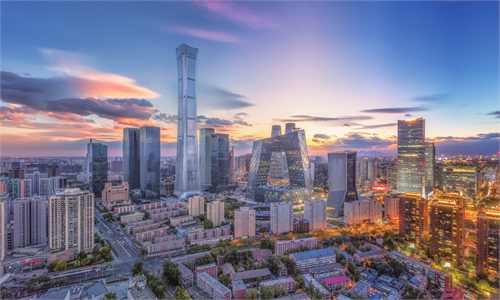COMMENTS / EXPERT ASSESSMENT
China’s deepening opening-up to favor global post-pandemic tourism

Illustration: Xia Qing/GT
China's Ministry of Culture and Tourism (MCT) recently relaxed ownership limits for foreign ownership of entertainment venues in China. Foreign investors will be allowed to establish wholly owned enterprises and have same approval procedures as domestic investors, according to a statement published on MCT's site.
China's tourism industry is making progress towards substantially widening market access for foreign investment. The implementation of the new rules for entertainment companies will further streamline administrative procedures for foreign investments and provide equal treatment to foreign businesses as domestic state-owned and private enterprises.
In fact, China's tourism and entertainment industries have become a relatively mature sector with a growing number of competitive local enterprises. For foreign companies that have already deeply integrated into the Chinese market, especially those with established brand advantages, the new rules are major positive news which can provides them opportunities to share the dividends of China's tourism industry's upgrading development. Major US entertainment companies that have invested in China's vast entertainment market saw their shares rise in market trading on Tuesday. Shares of Walt Disney Company, which runs a theme park in Shanghai, inched 0.11 percent higher to $178.84 per share on Tuesday. The stock outperformed some of its competitors on the strong trading day.
The high-quality development of China's tourism industry has been largely responsible for boosting the global tourism industry. China contributes a large number of tourists to popular tourism destinations every year, which makes substantial contribution to local growth. The vast domestic market also brings great opportunities for foreign investors.
Since the COVID-19 pandemic, the global tourism industry has suffered considerably. According to data from the World Tourism Organization (UNWTO), the crisis led to an annual decline of 74 percent in international tourist arrivals compared with 2019 figures. China, on the other hand, has achieved robust recovery across its own domestic tourism sector amid overall economic recovery since successfully drawing the virus under control. For the global tourism industry that has been severely hit by the COVID-19, China's continuous recovery and steady opening up will provide support for the full recovery of the global tourism industry in post-COVID era.
The recent May Day holiday has once again demonstrated China's rapid recovery. Across the holiday, 230 million passenger trips were made, up 119.7 percent year-on-year, with revenue reached 113.2 billion yuan ($17.7 billion). Such strong momentum has not only injected new vitality into the Chinese economy but also potential support for global post-COVID tourism.
In the development of China's tourism industry, consumption habits have changed markedly. Aside from sightseeing, the entertainment spend is taking up an increasing proportion, which is expected to provide more opportunities for foreign investors.
According to media reports, construction of Universal Beijing Resort is nearing completion, preparing to open in July. Sealand Securities predicts that after entering mature operation the yearly earning of the first term of the theme park is expected to reach 20 billion yuan, and after construction is completed, annual earnings could reach 60 billion yuan, media reports said.
The deepening opening-up of China's tourism sector is also a practical measure by China to fulfill its commitments entering the WTO. China has been actively opening the market to create a fair business environment for foreign companies. Western countries should end baseless criticism and accusation of China over the issue.
The author is professor of the leisure sports and tourism school of Beijing Sport University. bizopinion@globaltimes.com.cn



